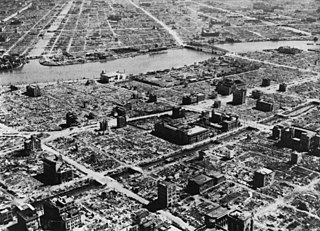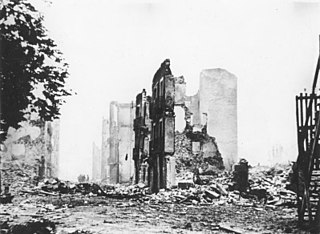
Guerrilla warfare is a form of irregular warfare in which small groups of combatants, such as paramilitary personnel, armed civilians, or irregulars, use military tactics including ambushes, sabotage, raids, petty warfare, hit-and-run tactics, and mobility, to fight a larger and less-mobile traditional military.
State terrorism refers to acts of terrorism which a state conducts against another state or against its own citizens.

Terrorism, in its broadest sense, is the use of criminal violence to provoke a state of terror or fear, mostly with the intention to achieve political or religious aims. The term is used in this regard primarily to refer to intentional violence during peacetime or in the context of war against non-combatants. The terms "terrorist" and "terrorism" originated during the French Revolution of the late 18th century but became widely used internationally and gained worldwide attention in the 1970s during the Troubles in Northern Ireland, the Basque conflict, and the Israeli–Palestinian conflict. The increased use of suicide attacks from the 1980s onwards was typified by the 2001 September 11 attacks in the United States.

Asymmetric warfare is a type of war between belligerents whose relative military power, strategy or tactics differ significantly. This is typically a war between a standing, professional army and an insurgency or resistance movement militias who often have status of unlawful combatants.

Strategic bombing is a military strategy used in total war with the goal of defeating the enemy by destroying its morale, its economic ability to produce and transport materiel to the theatres of military operations, or both. It is a systematically organized and executed attack from the air which can utilize strategic bombers, long- or medium-range missiles, or nuclear-armed fighter-bomber aircraft to attack targets deemed vital to the enemy's war-making capability. The term terror bombing is used to describe the strategic bombing of civilian targets without military value, in the hope of damaging an enemy's morale.
Non-combatant is a term of art in the law of war and international humanitarian law to refer to civilians who are not taking a direct part in hostilities; persons, such as combat medics and military chaplains, who are members of the belligerent armed forces but are protected because of their specific duties ; combatants who are placed hors de combat; and neutral persons, such as peacekeepers, who are not involved in fighting for one of the belligerents involved in a war. This particular status was first recognized under the Geneva Conventions with the First Geneva Convention of 1864.

The aerial bombing of cities is an optional element of strategic bombing, which became widespread in warfare during World War I. The bombing of cities grew to a vast scale in World War II, and is still practiced today. The development of aerial bombardment marked an increased capacity of armed forces to deliver ordnance from the air against combatants, military bases, and factories, with a greatly reduced risk to its ground forces. The killing of civilians and non-combatants in bombed cities has variously been a deliberate goal of strategic bombing, or unavoidable collateral damage resulting from intent and technology. A number of multilateral efforts have been made to restrict the use of aerial bombardment so as to protect non-combatants and other civilians.
There is no universal agreement on the legal definition of terrorism, although there exists a consensus academic definition created by scholars.
An insurgency is a violent, armed rebellion against authority waged by small, lightly armed bands who practice guerrilla warfare from primarily rural base areas. The key descriptive feature of insurgency is its asymmetric nature: small irregular forces face a large, well-equipped, regular military force state adversary. Due to this asymmetry, insurgents avoid large-scale direct battles, opting instead to blend in with the civilian population where they gradually expand territorial control and military forces. Insurgency frequently hinges on control of and collaboration with local populations.
Decapitation is a military strategy aimed at removing the leadership or command and control of a hostile government or group. The strategy of shattering or defeating an enemy by eliminating its military and political leadership has long been utilized in warfare.
International humanitarian law (IHL), also referred to as the laws of armed conflict, is the law that regulates the conduct of war. It is a branch of international law that seeks to limit the effects of armed conflict by protecting persons who are not participating in hostilities and by restricting and regulating the means and methods of warfare available to combatants.
Fourth-generation warfare (4GW) is conflict characterized by a blurring of the lines between war and politics, combatants and civilians.

Airborne leaflet propaganda is a form of psychological warfare in which leaflets (flyers) are scattered in the air.
Targeted killings, targeted prevention, or assassination, has been repeatedly carried out by the Israel Defense Forces (IDF) over the course of the Israeli–Palestinian conflict against militants. Nils Meltzer writes that "The term 'targeted killing' denotes the use of lethal force attributable to a subject of international law with the intent, premeditation and deliberation to kill individually selected persons not in the physical custody of those targeting them".

Substantial debate exists over the ethical, legal, and military aspects of the atomic bombings of Hiroshima and Nagasaki on 6 August and 9 August 1945 at the close of World War II (1939–45).
Air warfare must comply with laws and customs of war, including international humanitarian law by protecting the victims of the conflict and refraining from attacks on protected persons.
The main strategy and tactics of guerrilla warfare tend to involve the use of a small attacking, mobile force against a large, unwieldy force. The guerrilla force is largely or entirely organized in small units that are dependent on the support of the local population. Tactically, the guerrilla army makes the repetitive attacks far from the opponent's center of gravity with a view to keeping its own casualties to a minimum and imposing a constant debilitating strain on the enemy. This may provoke the enemy into a brutal, excessively destructive response which will both anger their own supporters and increase support for the guerrillas, ultimately compelling the enemy to withdraw. One of the most famous examples of this was during the Irish War of Independence. Michael Collins, a leader of the Irish Republican Army, often used this tactic to take out squads of British soldiers, mainly in Munster, especially Cork.

Targeted Killings: Law and Morality in an Asymmetrical World is a non-fiction compilation book about targeted killing edited by Claire Finkelstein, Jens David Ohlin, and Andrew Altman. It was published by Oxford University Press in 2012. The book grew out of contributions by the authors to a conference in April 2011 at the University of Pennsylvania Law School. Targeted Killings features eighteen essays in five sections arranged by topic. The work argues that after the 11 September attacks by Al-Qaeda in 2001, the United States and other countries began to see the tactic of targeted killing differently. The practice of targeted killing had previously been accepted in situations of self-defence in military settings; after 11 September 2001 it was used to kill non-combatants and those not directly involved in a particular armed force.
Human shields are legally protected persons—either civilians or prisoners of war—who are either coerced or volunteer to deter attacks by occupying the space between a belligerent and a legitimate military target. The use of human shields is forbidden by Protocol I of the Geneva Conventions. It is also a specific intent war crime as codified in the Rome Statute, which was adopted in 1998. The language of the Rome Statute prohibits "utilizing the presence of a civilian or other protected person to render certain points, areas, or military forces immune from military operations."

Air forces of the United Nations Command carried out an extensive bombing campaign against North Korea from 1950 to 1953 during the Korean War. It was the first major bombing campaign for the United States Air Force (USAF) since its inception in 1947 from the United States Army Air Forces (USAAF). During the campaign, conventional weapons such as explosives, incendiary bombs, and napalm destroyed nearly all of the country's cities and towns, including an estimated 85 percent of its buildings.








